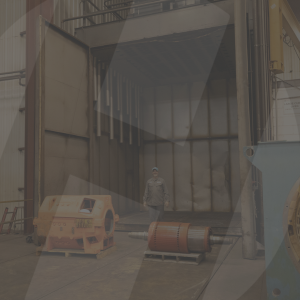Why Baking Ovens are Important in Electric Motor Repair
November 27, 2024
Moisture and electric motors don’t mix well. That’s why motors sent in for repair will eventually go into a baking oven to ensure its components are dry, cured, and ready to run upon return.
In this article, HECO will refer to baking ovens rather than higher-temperature, “burn-off” ovens that are used to remove coils in the rewind process.
How and when your repair vendor bakes an electric motor is key to high-quality, reliable repairs. So why is baking necessary?
Types of Baking
There are two different processes that require baking: cleaning and curing.
Repairs should always involve careful cleaning of the motor to remove any trace of contaminants such as dust, grease, and oil. In the process, motors are pressure washed or steam cleaned, causing the windings and other components of the motor to get wet.
That moisture must be baked out at high heat to prevent a winding failure from any remaining moisture.
Curing resin or varnish is another baking process required for electrics. Whether a motor needs a full rewind or a recondition, a varnish dip or a VPI (Vacuum Pressure Impregnation) process may be required. With either method, the resin or varnish must be heat-cured.
The curing process usually takes significantly longer to complete than baking the moisture out; curing can take just shy of a day. On some lager machines the baking cycle can be 24 to 36 hours. When curing, it is vital that the resin is fully cured and that it has not been applied over trapped moisture from the cleaning process to reduce the risk of failure.
Measuring Baking Times
At HECO, we use gas-fired, forced-air ovens for the baking process. Based on our extensive experience, these ovens are ideal for parts with a significant amount of mass such as electric motor stators and windings.
Baking cycle times primarily depend on the mass and size of the part being baked. As the size and mass of a part increases, so does the respective baking time, also known as the soak time. A very precise temperature probe known as a thermocouple is attached to the middle area of a part’s mass to track its temperature inside the oven. Once the probe indicates that the target temperature has been reached, the soaking time begins, and the temperature is maintained.
It is important that the temperature of the part is not raised too quickly, as to cause the moisture to turn to steam. If this happens the insulation system can be severely damaged. On DC machines, a high rate of temperature rise can affect the integrity of the commutator assembly.
For example, after steam cleaning, a motor might need to soak for 12 to 14 hours at a temperature of 220-250°F depending on mass and size. The timed portion of the bake does not start until the temperature probe indicates that the temperature at the center of the motor mass is between 220-250°F. At that point, the heating time for the motor begins.
Extra Baking Considerations & Precautions
When a rewind or a varnish dip on a reconditioned motor has been performed, parts of the motor must be baked after cleaning as well as part of the curing process. In these cases, required heating times depend not only on the mass and size of the motor, but also on the manufacturer guidelines for the type of resin used (typically polyester or epoxy).
At HECO, we don’t like to leave anything to chance. That’s why we include sacrificial stator coils in our rewind process.
These sacrificial coils go through the same steps as the full motor rewind and are evaluated at various points to ensure that the insulation is void-free and fully cured. Sacrificial coils are included in the oven during the baking process. After baking, a coil will be cut open to observe and verify the resin penetration and quality of insulation achieved.
All Systems Go
Whether baking is required for cleaning or curing, nothing can be done to hurry the process. It’s also impossible for a technician to work on a motor that is baking.
These are a few of the reasons why a high-quality repair may take a little longer than a quick fix. The extra investment of time will pay off in better reliability and performance in the long run.
HECO has been in business since 1959, bringing decades of experience and expertise to servicing, selling, monitoring, and storing electric motors and rotating equipment to each project.
Contact us to put our expertise to work for your parts, systems, and processes.
Posted in Repair
